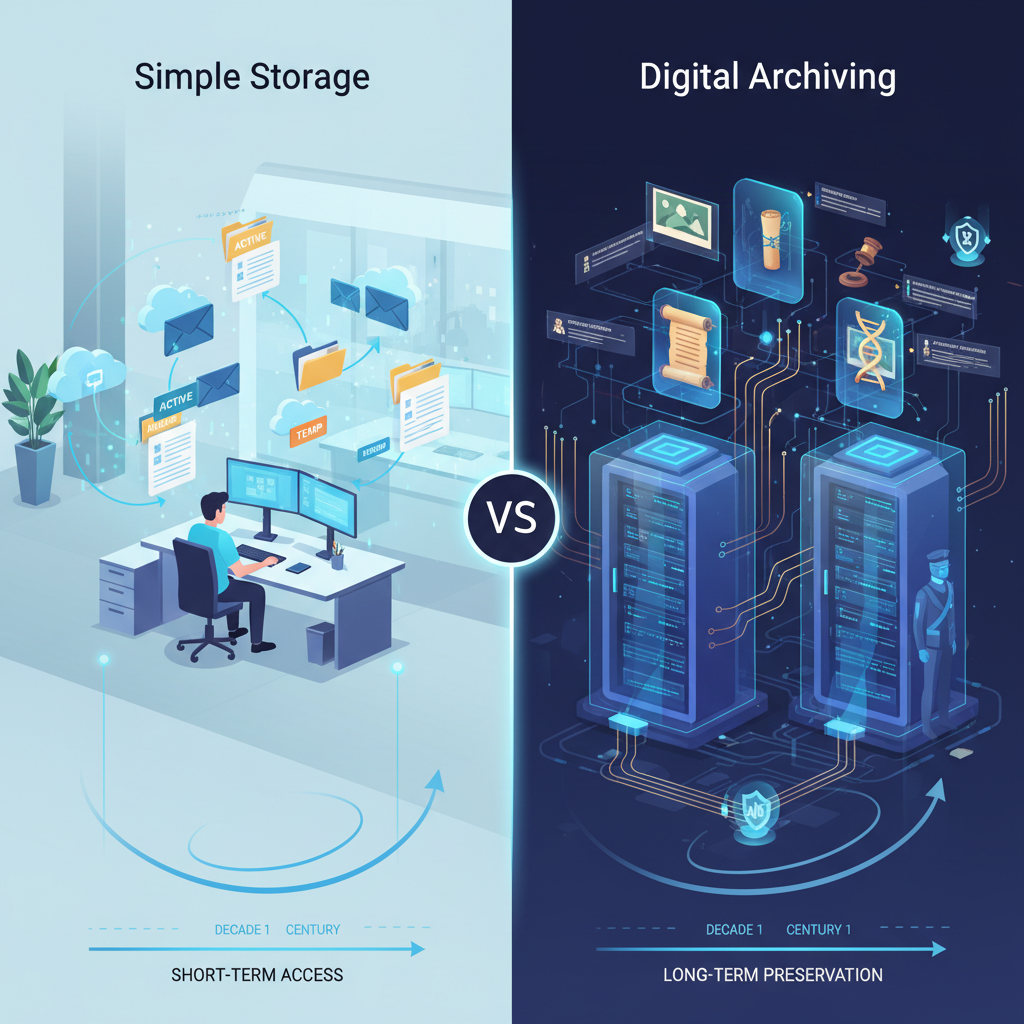In the age of digital transformation, managing an organization's growing data effectively is more important than ever. Decision-makers are increasingly tasked with choosing between Digital Archiving and simple storage solutions. While both are crucial for data management, they serve different functions digital archiving offers long-term preservation and organization, while simple storage focuses on basic data storage without added complexities.
What Digital Archiving Really Means for Your Business
Digital Archiving goes beyond simply storing files. It involves preserving data with features such as metadata tagging, indexing, and retention policies to ensure that documents remain accessible, secure, and compliant with regulations. This method is ideal for organizations that need to maintain records over extended periods, like healthcare providers or financial institutions, where compliance with data retention laws is essential.
How Simple Storage Measures Up: A Closer Look at Its Functionality
Simple storage solutions like cloud drives are great for storing files that need to be accessed regularly, but they lack the robust features of Digital Archiving. These solutions typically focus on providing space for documents without tagging, indexing, or compliance features. They are ideal for everyday document collaboration but fall short when long-term data preservation and regulatory compliance are required.
Key Differences Between Digital Archiving and Simple Storage
Organization and Searchability: Which One Offers Better Data Access?
One of the major advantages of Digital Archiving is its ability to organize data in a structured way, making it easy to search and retrieve information even years later. Simple storage, on the other hand, tends to leave data disorganized, making it harder to locate specific documents as the volume increases. Archiving systems ensure that data can be found quickly, while storage systems often rely on basic folder organization.
Data Security: Protecting Your Information Long-Term
Digital Archiving offers advanced security features like encryption, access controls, and audit trails, ensuring that sensitive data is safe from unauthorized access. It also helps organizations comply with various data protection regulations. Simple storage services may offer some security, but they don't provide the same level of protection or compliance features, making them less suitable for highly regulated industries.
Cost-Effectiveness: Weighing the Long-Term Investment
While Digital Archiving may involve higher upfront costs due to its complex features, it often leads to long-term savings by reducing data management inefficiencies, preventing compliance issues, and improving accessibility. Simple storage is more cost-effective in the short term but can become expensive and inefficient as the volume of data grows. Over time, the lack of organization and security features in storage solutions can also lead to higher hidden costs.
Long-Term Data Retention: Keeping Information Accessible for Years to Come
Digital Archiving is specifically designed for long-term data retention. It ensures that data remains intact, accessible, and searchable even as technology evolves. Simple storage, however, is less equipped to handle the complexities of long-term data management, and as time passes, it may become increasingly difficult to retrieve older files due to changes in formats, software, or hardware.
When Should Your Organization Opt for Digital Archiving?
Choosing Digital Archiving over simple storage is best for businesses that need to maintain data over long periods for legal, compliance, or operational reasons. Industries such as healthcare, finance, legal, and government require archiving to store patient records, financial statements, and legal documents, often under strict regulatory guidelines. For these sectors, digital archiving provides the necessary tools to ensure data integrity and compliance.
Conclusion:
Ultimately, the choice between Digital Archiving and simple storage depends on the needs of your organization. While simple storage is adequate for everyday use, Digital Archiving is the superior solution when it comes to preserving, securing, and organizing critical data for the long haul. By understanding the unique capabilities of each system, decision makers can make informed choices that align with their business goals, ensuring data remains accessible, secure, and compliant for years to come.

